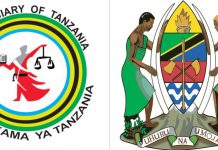AfricaPress-Tanzania: THE Judiciary of Tanzania has recorded major reforms in the administration of judicial functions and dispensation of justice since the Judiciary Administration Act came into force, the Principal of the Institute of Judicial Administration Lushoto, Dr Paul Kihwelo, has said.
Such Act of 2011 divided various functions within the Judiciary by decoupling court administration from the judicial function, leading to the creation of two offices, namely, the office of the Chief Court Administrator and the office of the Chief Registrar.
Before the enactment of the law, according to him, both administration and judicial functions were being performed by court registrars within the Judiciary from either Court of Appeal or High Court level.
Presenting a topic at the just ended training of court reporters and editors held in Morogoro Region recently under the organisation of the Institute, Dr Kihwelo, who is also a Judge of the High Court, pointed out that under the new structure, the case management is under Chief Registrars Office.
“When you talk about the Judiciary, the people want to know progress and determination of cases. A lot of achievements have been done here. The Registrars are now concentrating on determination of cases and dispensation of justice in general, as opposed to previous court system,” he said.
According to him, in terms of section 28 (1) of the Judiciary Administration Act, the Chief Registrar is now responsible for facilitating and supervising performance of judicial functions and coordinates judicial matters.
“He is a link between the Judiciary and the Commission on appointment, promotion and disciplinary matters of judicial officers, and communicates to the government on matters relating to judicial profession, or any other matters which the government may be concerned,” the Principal said.
Dr Kihwelo explained further that the coming of the new law also vested all administration matters under the Chief Court Administrator, who is appointed by the President of the United Republic of Tanzania upon the recommendation from Judicial Service Commission.
“The Chief Court Administrator is now responsible for all court administration systems and related logistical arrangements. He is the head of the general administration of the Service, the Chief Executive Officer of the Service and responsible to the Commission and the Chief Justice,” he said.
The Judiciary of Tanzania is established under Article 107A of the Constitution of the United Republic of Tanzania of 1977.
Such provision states that the Judiciary shall be the authority with final decision in dispensation of justice in the United Republic of Tanzania.
Judiciary works under five principles when deciding civil and criminal matters in accordance with the laws.
These are impartiality to all without due regard to one’s social or economic status and not to delay dispensation of justice without reasonable ground.
It has also the duty to award reasonable compensation to victims of wrong doings committed by other persons, promote and enhance dispute resolution among persons involved in the disputes and dispense justice without being tied up with technical provisions which may obstruct dispensation of justice.




